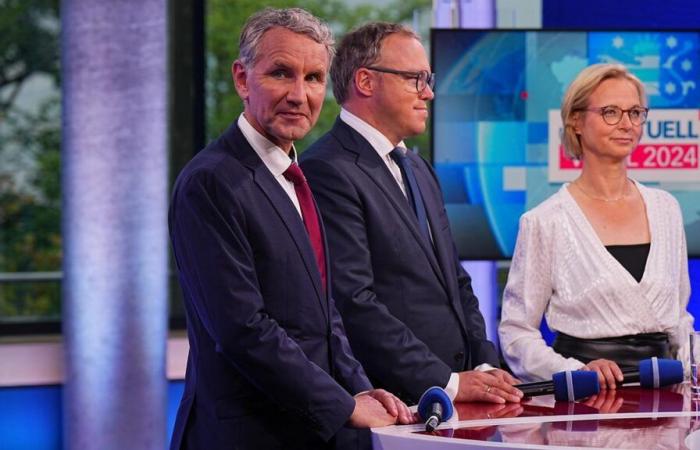analyse
Status: 01.09.2024 22:09
Even if Höcke insists, the AfD will probably not be part of the government in Thuringia. Now it depends on whether the CDU can forge an alliance with BSW and SPD – perhaps with the help of the Left Party.
It has happened. In Thuringia, the AfD has become the strongest force in a state election for the first time – in a state where the party is classified as definitely right-wing extremist by the Federal Office for the Protection of the Constitution. In all likelihood, it will again remain without a coalition partner and without participation in government, but this time it will not be without power. The new state parliament will depend on it, as it is likely to have more than a third of all representatives.
For example, the very body that is supposed to monitor the Office for the Protection of the Constitution is not able to function: the Parliamentary Control Commission. A two-thirds majority is also needed to fill this position, and this means votes from the AfD.
AfD is extreme – and yet normal for many
Björn Höcke has led the AfD into this situation. Höcke has exaggerated every problem to the extreme. During the election campaign, he promised people not orderly migration, but one that would be practically zero and would deprive the last few asylum seekers of their rights. Little of this was constitutional.
Höcke spoke about the position of the earth’s axis instead of climate protection. He wanted to drive the “American hegemon” out of Europe and “gender mainstreaming” – and thus learning about equality and sexual diversity – out of Thuringian schools.
The teacher, who comes from West Germany, trivialized his ideology with the slogan “The East does it” and with photo rides on the GDR cult moped Simson. Above all, however, the Höcke AfD has managed to attract new voter groups by criticizing corona measures, the war in Ukraine and inflation.
A shift in discourse also helped the AfD on its way to normalization. “In the past, people had to justify being for the AfD. Today, that’s the case with the Greens.” This is how an AfD official summed up the mood shortly before the election. The CDU, Sahra Wagenknecht and some of the media played a major role in this.
CDU leader Friedrich Merz, for example, had declared the Greens to be his party’s “main opponent” following the impact of the failed heating law. The trigger for this was precisely the election in Thuringia a year ago that revealed the AfD’s potential: the district election in Sonneberg. The logic of “everyone against one, all democrats against the AfD” was thus shattered, even if an anti-AfD effect still exists today.
CDU: Voigt’s strategy is working
The other winner is Mario Voigt. He has switched the CDU’s election campaign, which had been planned long in advance, from opponent Bodo Ramelow to Höcke. Instead of the popular state premier, the relatively unknown Voigt moved up the AfD leader – and thus overtook Ramelow. Contrary to what it seemed in early summer, the Sahra Wagenknecht alliance was no longer a threat to him.
For Voigt, second place in the polls was apparently decisive: The CDU is benefiting massively from an anti-AfD effect in Thuringia. The party that once governed Thuringia alone is now getting a second chance to establish itself among the population.
Voigt now wants to sit down with the SPD. After that, cooperation with the BSW will be explored. And if the three parties together narrowly miss a majority in the state parliament, which is what it looks like late on Sunday evening, the Left Party would also have to be included. For Mario Voigt, these second and third steps will be the real test.
The CDU’s result is probably strong enough to keep quiet those within the party who are calling for cooperation with the AfD. A clear majority of Thuringians also reject the AfD’s participation in the government. However, Wagenknecht’s party would by no means be an easy partner.
BSW: New opportunities, new problems
A part of the population has been yearning for this new party. Just one week after the party was founded, the BSW was polling at 17 percent in Thuringia. In the election, the young party is now coming in just under that.
The regional association is small, with only a few dozen members. However, some of them have known each other for a long time. The tone in the Thuringian BSW is definitely more constructive than that of its namesake Sahra Wagenknecht, and the tone towards Wagenknecht herself is self-confident.
The party leader will not personally participate in the coalition negotiations, said top candidate Katja Wolf after the election in the ARD. This is exactly what Sahra Wagenknecht said to tagesschau.de and other media previously promised.
Compromises can probably be found for the common positions on arms aid to Ukraine and missile stations in Germany, which Wagenknecht had declared to be “red lines”. If necessary, a coalition could agree on less than a classic coalition agreement. These considerations are also being considered. The opportunity for a new style of politics is there.
There is also a template in the form of the so-called Stability Pact, which the red-red-green minority coalition concluded with the then opposition CDU faction in 2020. This paper would have to be revived if necessary anyway, should the CDU, SPD and BSW need the votes of the Left Party. The practice at the time teaches us that within the CDU this is not seen as a contradiction to the Left’s demarcation decision.
What is more questionable is how stable the BSW will then be – and how much interest Wagenknecht herself has in a successful collaboration with the CDU and SPD. Because the success of the BSW is primarily due to her personality and her populism. In the AfD, many are pinning their hopes on the BSW.
Only one traffic light party saved
In the coming months, the AfD will push for the election of the Prime Minister to be held quickly after the election of a State Parliament President. A coalition would have to have been agreed by then, because the election of the Prime Minister is secret. Four years ago, the AfD tricked the FDP politician Thomas Kemmerich into the office of Prime Minister and triggered the Thuringian crisis.
Kemmerich is no longer in office. His clear anti-traffic light policy did not help the FDP. However, Thuringia was never a core region for the FDP, just like for the Greens.
The Greens were not helped by the fact that the party, as a “peace party”, loudly pushed for arms deliveries to Ukraine at the federal level, nor by the fact that they replaced their top personnel in Thuringia in a strange move a year before the election.
And in the end, more people apparently trusted the SPD to become part of a stable majority government than the unpopular Greens.
Left: Ramelow’s limits
The Prime Minister is still called Bodo Ramelow. Germany’s only left-wing head of government had reached his limits during the Corona pandemic. Not because he played “Candy Crush” during the long meetings with the Chancellor, but because he could no longer overcome divides.
In the months before the election, hardly a meeting went by without him reporting on personal attacks from right-wing extremists and lateral thinkers from that time. The Prime Minister often justified himself. In this way, he was convincing as a person, but not as a politician.
Even before the BSW was created, the Left had already lost almost a third of its support in Thuringia. A Ramelow who was so upset could not make up for this in the face of Wagenknecht and the Left’s dire situation. This time, even a prime minister bonus did not help.
But Bodo Ramelow will not resign after the election, but will stick to his message: he wants to support the formation of a coalition. “I will do my part,” said Ramelow in the ARDBut the left would have to be used for this.
After this evening, Thuringia may once again have a government with its own majority. But thanks to the AfD’s blocking minority, the state is still threatened by paralyzing political discussions. That’s what the voters wanted.






